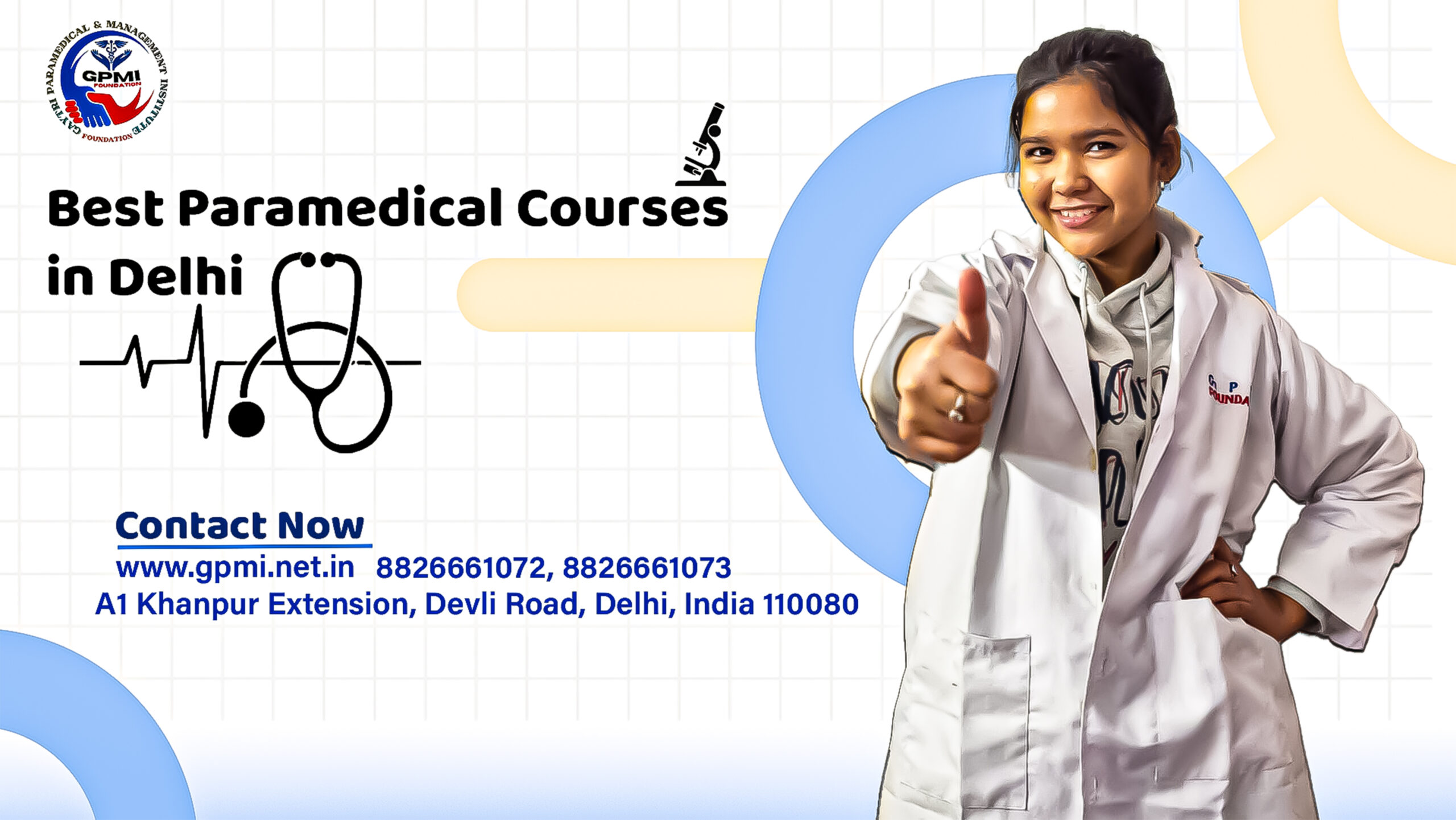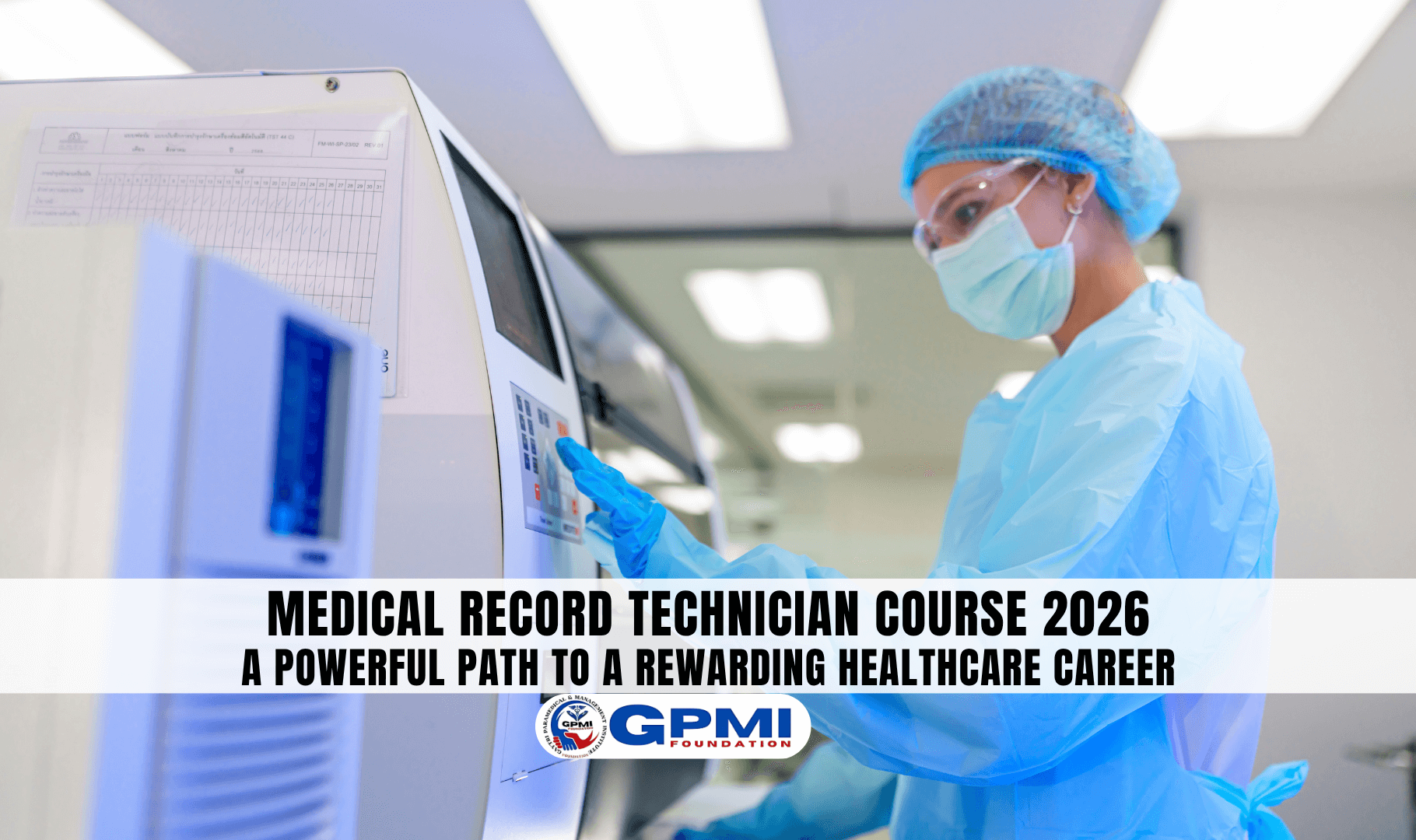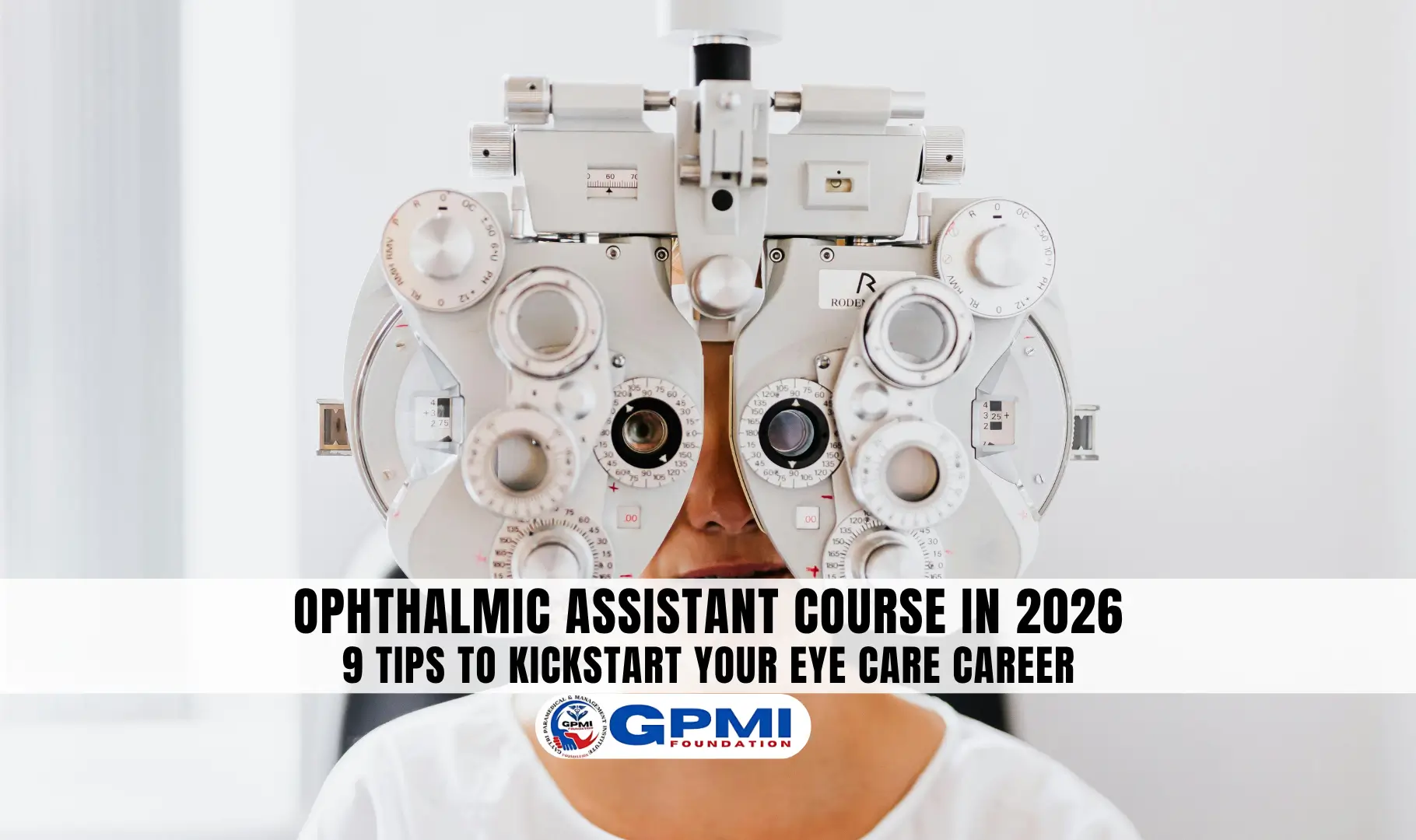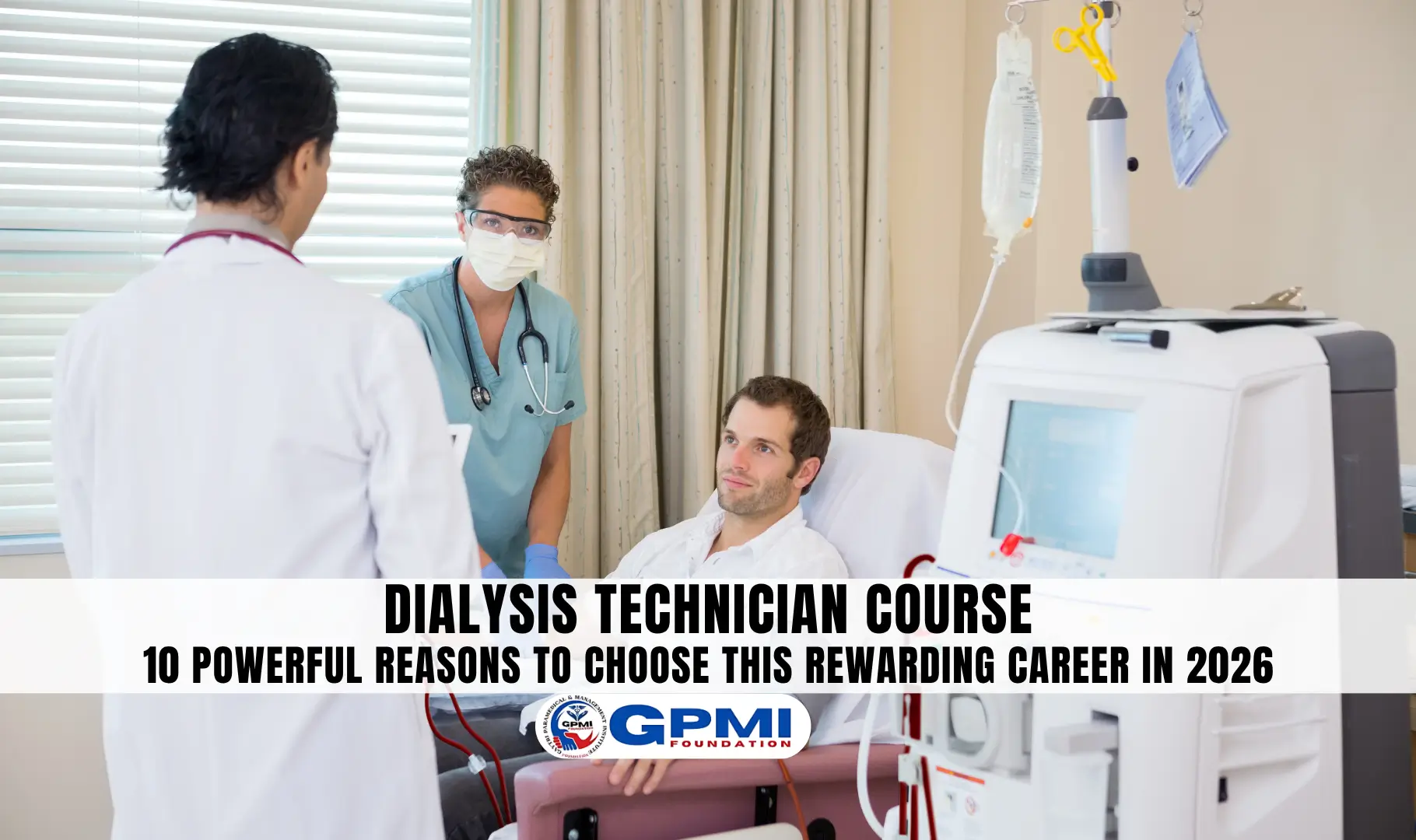The heart is one of the most important organs in the human body. It keeps us alive by pumping blood and oxygen to every part of the body. When something goes wrong with the heart, it needs immediate and careful attention. This is where Cardiac Care Technicians play a very important role.
A Cardiac Care Technician is a trained healthcare professional who helps doctors diagnose and treat heart-related problems. They work closely with cardiologists and nurses to monitor the patient’s heart condition, perform ECGs, stress tests, and assist during heart procedures. Their job is to ensure that every heartbeat is monitored correctly and that patients get the right care at the right time.
If you are a student who has completed 12th standard (especially in the Science stream) and want to build a career in the healthcare field, then the Cardiac Care Technician Course can be a smart and rewarding option. This course teaches you how to use modern machines and techniques to check heart function and detect heart diseases.
The best part about this course is that you don’t need to be a doctor to save lives. As a Cardiac Care Technician, you can still make a real difference in people’s lives by helping doctors treat heart patients. The demand for trained cardiac technicians is increasing every year because of rising heart problems and lifestyle diseases in India and across the world.
A career as a Cardiac Care Technician offers good job stability, respect in society, and opportunities to work in top hospitals, diagnostic centers, and heart institutes. After completing this course, you can work as an ECG Technician, Cardiac Technician, or Assistant to a Cardiologist. With experience and advanced learning, you can grow your career in various specializations of cardiac care.
In this complete guide, you will learn everything about the Cardiac Care Technician Course after 12th — including eligibility, course duration, syllabus, career scope, salary, and much more. Whether you want to start working right after 12th or plan to build a long-term career in healthcare, this course can open many exciting doors for your future.
Table of Contents
Eligibility Criteria for Cardiac Care Technician Course
Before you apply for the Cardiac Care Technician Course, it’s important to know whether you meet the eligibility requirements. The good news is that this course is open to many students, especially those who are passionate about working in the medical and healthcare field.
Here are the basic eligibility criteria for becoming a Cardiac Care Technician:
1. Educational Qualification
To join the Cardiac Care Technician Course, students must have completed their 12th standard (10+2) from a recognized board.
- The preferred subjects in Class 12 are Physics, Chemistry, and Biology (PCB).
- Some institutes may also accept students from Science or Vocational backgrounds related to healthcare.
- A minimum of 45% to 50% marks in Class 12 is generally required for admission.
If you studied Maths, Arts, or Commerce, some colleges may still allow admission through special entrance tests or bridge programs, but Science students get the most benefit.
2. Age Limit
The minimum age to join this course is usually 17 years.
There is no strict upper age limit, but most students join soon after completing their 12th standard to start their career early in the medical field.
3. Entrance Exam (If Applicable)
Many institutes, including Gaytri Paramedical & Management Institute (GPMI), offer direct admission based on your 12th marks.
However, in some colleges or universities, students may have to appear for a short entrance exam or interview to check their basic knowledge of biology and interest in the healthcare field.
4. Personal Qualities Needed
Besides educational qualifications, a student must also have some personal qualities to become a good Cardiac Care Technician:
- Strong interest in biology and human health
- Good communication skills to talk with patients and doctors
- Patience and attention to detail
- Ability to handle modern medical equipment
- A caring and helping attitude toward patients
If you have these skills and a desire to work in the medical field, then this course is the right choice for you.
Why Eligibility Matters
Meeting the eligibility criteria ensures that you can easily understand the medical concepts taught during the course. Since cardiac care involves working with delicate machines and patients with serious heart issues, having a strong base in science helps you perform your duties more confidently and accurately.
Course Duration and Structure
The Cardiac Care Technician Course is designed to give students both theoretical knowledge and practical training in heart care. The duration of the course may differ depending on the institute and the type of program you choose, but the overall goal is to prepare students for real-life hospital work.
Course Duration
Generally, the Cardiac Care Technician Course lasts for 2 to 3 years.
- Diploma Course – 2 years
- Bachelor or B.Voc Course – 3 years
- Certificate Course – 6 months to 1 year
Most students choose a 2-year diploma course right after completing 12th, as it helps them start working early and gain experience in hospitals or clinics.
Course Structure
The course is divided into semesters or yearly modules. Each semester includes a mix of classroom learning, lab practice, and clinical training. Students are taught how to handle patients, operate heart monitoring machines, and understand the basics of cardiac science.
The training part is very important because students get to work in real hospital environments, observe patient care, and assist doctors during heart checkups or minor procedures. This hands-on experience builds confidence and makes them job-ready by the time they finish the course.
Teaching Methods
During the course, students learn through:
- Classroom lectures and presentations
- Practical sessions in cardiac labs
- ECG and echocardiography demonstrations
- Case studies and patient simulations
- Hospital internships and clinical rotations
This structured learning ensures that every student understands how the human heart works and how to handle patients safely and professionally.
Focus Areas
The main focus of the course is on:
- Identifying heart diseases
- Performing diagnostic tests
- Using cardiac care equipment
- Helping doctors during cardiac procedures
- Recording and analyzing heart data
Why Course Duration and Training Matter
A strong foundation in both theory and practical skills helps students build confidence before stepping into hospital settings. Cardiac patients often need immediate care, so technicians must be quick, accurate, and calm. The training provided in this course prepares you to handle such situations effectively.
Fees for Cardiac Care Technician Course

One of the first things students and parents want to know before joining a course is the fees. The cost of the Cardiac Care Technician Course can vary depending on the institute, course type, and duration.
Average Fees
- Certificate Course (6 months to 1 year): ₹25,000 – ₹50,000
- Diploma Course (2 years): ₹50,000 – ₹1,00,000
- B.Voc / Degree Course (3 years): ₹1,00,000 – ₹2,00,000
Factors Affecting Fees
- Type of Institute: Private institutes may charge more, while government or semi-government institutes are usually more affordable.
- Course Duration: Longer courses like diplomas and degrees cost more because they offer extensive training and practical exposure.
- Facilities & Equipment: Institutes with modern labs, ECG machines, and hospital tie-ups may charge higher fees.
- Internship & Placement Support: Institutes that provide internships and placement assistance may have slightly higher fees, but it’s a good investment for your career.
Is the Course Worth the Fees?
Absolutely! Considering the growing demand for Cardiac Care Technicians, the fees are a small investment for a stable and rewarding career in healthcare. By completing this course, you gain knowledge, practical skills, and job-ready experience that can help you start earning immediately after graduation.
Many students also consider this course a stepping stone for higher studies in cardiac technology or healthcare management, which can increase their earning potential in the future.
Detailed Syllabus of Cardiac Care Technician Course
The Cardiac Care Technician Course is designed to give students both theoretical knowledge and practical skills needed to work in hospitals, clinics, and heart care centers. The syllabus covers subjects related to heart anatomy, diagnostics, patient care, and modern cardiac technology.
Core Subjects in the Course
- Anatomy and Physiology – Learn about the structure of the human body, especially the heart and circulatory system.
- Basics of Cardiology – Study common heart diseases, their causes, and treatments.
- ECG (Electrocardiography) – Learn how to perform ECG tests, read results, and identify irregular heart patterns.
- Echocardiography (ECHO) – Understand how ultrasound helps examine the heart’s structure and function.
- Patient Monitoring – Learn how to monitor heart patients using modern equipment.
- Medical Terminology – Understand common medical terms used in hospitals and by doctors.
- Pharmacology Basics – Learn about medicines commonly used in cardiac care and their effects.
- Emergency Care and First Aid – Train in handling cardiac emergencies like heart attacks.
- Internship & Clinical Training – Practical exposure in hospitals, working under supervision to gain hands-on experience.
Practical Skills You Will Learn
- Performing ECG and ECHO tests
- Recording patient data accurately
- Assisting cardiologists during procedures
- Operating cardiac monitoring devices
- Handling emergencies calmly and effectively
Why the Syllabus is Important
The syllabus is carefully structured to give students a balance of knowledge and practical skills. By the end of the course, you not only understand how the heart works but also know how to use machines, assist doctors, and care for patients safely.
Completing this course gives you the confidence to start working immediately in hospitals or clinics or pursue advanced courses in cardiac technology.
Career Scope After Cardiac Care Technician Course
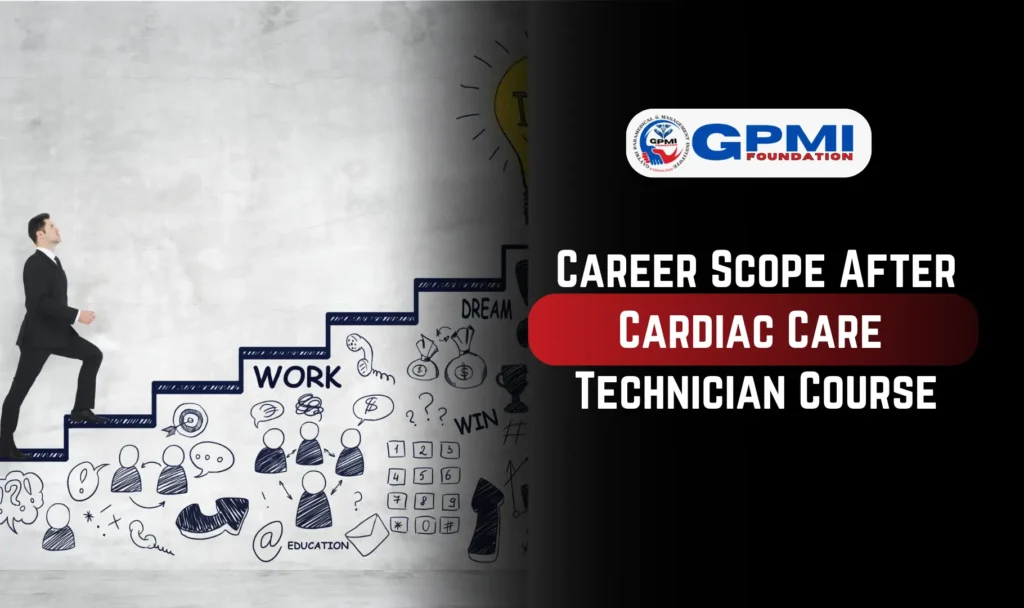
The Cardiac Care Technician Course opens many doors for students who want a stable and rewarding career in healthcare. With the increasing number of heart patients in India and worldwide, the demand for skilled cardiac technicians is rising every year.
Why Career Scope is Bright
- High Demand in Hospitals: Every hospital with a cardiology department needs trained cardiac care technicians to assist doctors and monitor patients.
- Opportunities in Diagnostic Centers: Cardiac diagnostic centers, clinics, and heart institutes regularly hire technicians to perform ECGs, stress tests, and echocardiography.
- Growing Healthcare Industry: The healthcare sector in India is expanding rapidly, creating more jobs for trained medical professionals.
- Work in Private & Government Sector: You can work in both private hospitals and government health services, ensuring flexibility and security.
Specializations and Advanced Studies
After completing the course, you can also pursue higher studies or certifications in:
- Advanced Cardiac Life Support (ACLS)
- Cardiac Imaging and Diagnostics
- Cardiac Rehabilitation Programs
- Hospital Administration in Cardiology
These specializations allow you to increase your salary, gain expertise, and advance your career in the field of cardiac care.
Additional Opportunities
- Working in ambulance services and emergency cardiac care teams
- Joining research centers or medical labs for heart-related studies
- Teaching and training future cardiac care technicians
Conclusion on Career Scope
In short, a Cardiac Care Technician has excellent career scope due to high demand, multiple job opportunities, and growth potential. It’s a profession where your skills directly save lives, giving both job satisfaction and financial stability.
Job Opportunities After Cardiac Care Technician Course
After completing the Cardiac Care Technician Course, you will have plenty of job opportunities in hospitals, clinics, and diagnostic centers. The healthcare industry is expanding fast, and the need for skilled technicians who can assist doctors in heart care has grown more than ever before.
Top Job Profiles You Can Apply For
- Cardiac Care Technician
- You will assist cardiologists during heart checkups, monitor patients’ heartbeats, and operate machines like ECG and ECHO.
- This is the most common and in-demand role after the course.
- ECG Technician
- Your main responsibility will be performing Electrocardiogram (ECG) tests to record heart activity and identify irregularities.
- Echocardiography Assistant
- You will help doctors during Echocardiography (ECHO) procedures and maintain the machine and reports.
- Cardiac Monitoring Technician
- In this role, you’ll monitor patients in the ICU or cardiac wards and alert doctors about any abnormal changes in heartbeat or blood pressure.
- Cardiology Assistant
- You’ll assist cardiologists in preparing patients for surgeries, checking equipment, and handling medical records.
- Medical Lab Assistant (Cardiac Department)
- Some technicians work in labs that specialize in heart disease testing and analysis.
- Emergency Cardiac Technician
- You can work in emergency units or ambulances, helping doctors handle critical patients during heart attacks or cardiac arrests.
Places Where You Can Work
After completing this course, you can find employment in various healthcare sectors such as:
- Government and Private Hospitals
- Heart and Cardiac Care Centers
- Diagnostic and Pathology Labs
- Nursing Homes and Multispecialty Clinics
- Rehabilitation and Research Centers
- Emergency Medical Services
Some technicians also choose to work abroad after gaining a few years of experience since Cardiac Care Technicians are in demand globally, especially in the Middle East and European countries.
Work Environment
Cardiac Care Technicians generally work in clean and advanced hospital settings. Their duties include operating machines, monitoring patients, maintaining records, and assisting doctors. Although the job may sometimes involve long hours, it brings a sense of satisfaction as you are directly helping save lives.
Why These Job Opportunities Matter
Unlike many other professions, healthcare jobs are recession-proof — meaning they will always be in demand. Heart-related problems are increasing in every age group, which means more hospitals are hiring skilled cardiac technicians every year.
So, if you complete your Cardiac Care Technician Course from a reputed institute like GPMI, you can expect stable employment, respect, and a good starting salary.
Salary and Growth Opportunities for Cardiac Care Technicians
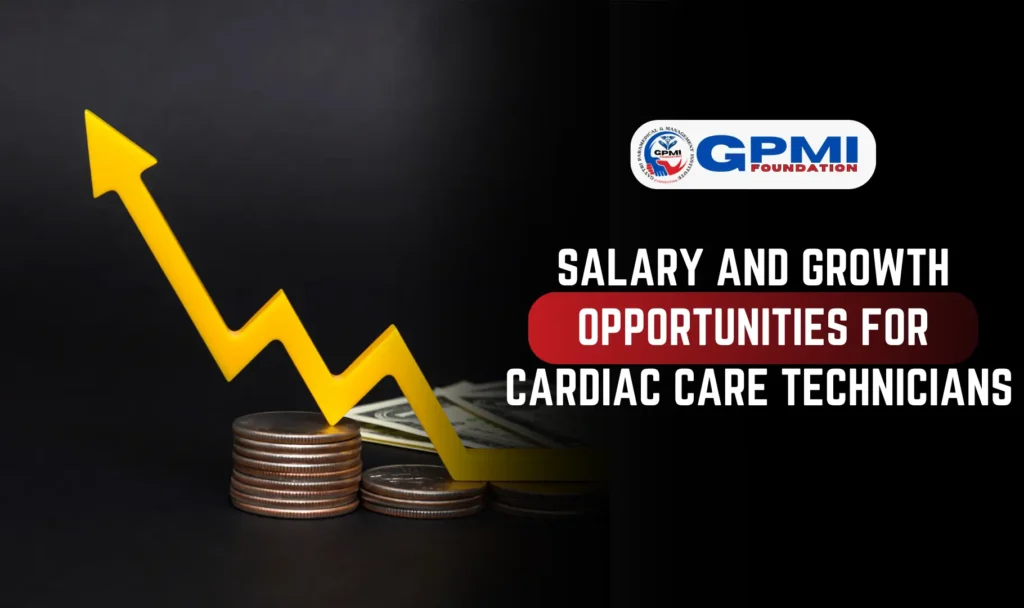
One of the most common questions students have before joining any course is — “How much salary will I earn after completing this course?” The good news is that a career as a Cardiac Care Technician offers both a respectable income and excellent growth opportunities.
Starting Salary After Course Completion
After completing your Cardiac Care Technician Course, your salary depends on your skills, location, and the type of hospital you work in.
Here’s a general idea:
- Freshers (0–1 year experience): ₹15,000 – ₹25,000 per month
- Experienced Technicians (2–5 years): ₹30,000 – ₹50,000 per month
- Senior Technicians / Supervisors: ₹50,000 – ₹80,000 per month or more
If you work in a private or multispecialty hospital, your salary is usually higher than in smaller clinics. With time, experience, and additional training, your earnings can grow significantly.
Salary Abroad
Many trained cardiac technicians also get job offers in countries like UAE, Saudi Arabia, Canada, and the UK.
In these countries, technicians earn around ₹1.5 lakh to ₹3 lakh per month (in Indian currency), along with other benefits such as accommodation and medical insurance.
Factors That Affect Salary
- Type of Organization: Private and corporate hospitals pay more than small clinics.
- Experience Level: The more experienced you are, the higher your pay.
- Additional Skills: Knowledge of advanced equipment and latest cardiac care technologies boosts your value.
- Education Level: Students with a B.Voc or advanced diploma in cardiac care earn better salaries than basic certificate holders.
Career Growth Opportunities
This profession doesn’t stop at being a technician. With more experience and knowledge, you can grow into higher positions such as:
- Senior Cardiac Technician
- Cardiac Technologist
- Medical Supervisor
- Department Coordinator
- Trainer or Instructor for Paramedical Students
You can also choose to study further in specialized areas like Cardiac Imaging, Cardiac Rehabilitation, or Hospital Management to move into leadership roles.
Why the Future Looks Promising
Heart diseases are becoming common in all age groups due to stress and lifestyle changes. This means the need for cardiac technicians will keep increasing. Hospitals and healthcare organizations are always looking for skilled professionals who can handle patients and modern medical equipment confidently.
So, if you choose this career today, you are securing a bright and stable future in the healthcare industry.
Conclusion: A Smart and Rewarding Career Choice
The Cardiac Care Technician Course is one of the most promising and respected paramedical programs after 12th. It allows you to enter the healthcare industry quickly and start working in hospitals, clinics, or diagnostic centers — helping patients with heart-related problems.
If you are a student who wants to make a real difference in people’s lives, this course can be your perfect choice. You don’t need to become a doctor to save lives — as a Cardiac Care Technician, your role is equally important in ensuring that patients get the right care and treatment at the right time.
This field offers:
- Strong job opportunities in both private and government hospitals
- Good starting salary with rapid growth potential
- Respect and satisfaction from helping others
- Chances to work abroad after gaining experience
With the right training and practical exposure, you can build a long-term, stable, and rewarding career in cardiac care.
So, if you have completed your 12th and are looking for a career that offers stability, respect, and purpose, then join the Cardiac Care Technician Course and take your first step toward a successful career in the healthcare industry.




